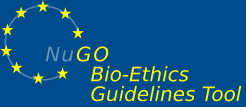- Home
- NuGO Guidelines
-
Definitions
-
Examples
-
Background
-
This is a static version of the NuGO Bioethics Guidelines Tool from 2007. Some links may be outdated. Searching is disabled. Please contact the authors for comments or questions
General Principles
Preface
The enhancement of knowledge in the field of nutrigenomics research aims at the wellbeing and quality of life of humans and the prevention and treatment of conditions by diet. This kind of knowledge can only be achieved by using human biological material in large numbers.
As part of its work on setting standards and establishing guidelines for nutrigenomics research, the European Nutrigenomics Organisation (NuGO) has developed the present bioethical guidelines for those engaged in human nutrigenomics studies.
All guidelines focus on human research and were set up according to international rules for which a consensus among European countries was achieved and documented. The guidelines apply to nutrigenomics research that: 1) involves an intervention on a person in the context of a research project (e.g. randomized trial with supplements); 2) uses biological material that has been or is to be removed to be stored for research uses; 3) uses biological material that was removed for a different purpose, i.e. other than 1 or 2 (e.g. left over tissue from medical treatment)
The NuGO guidelines do not constitute a legal text. In any case, research involving humans needs to be subject to domestic ethical approval which will have to be guided by the domestic law and the rules offered by the domestic ethical committee. The NuGO guidelines give general advices that may be used in the context of ethical approval, already during the phase of study design, or for education. By their application, human nutrigenomics research ethics will be standardized throughout the scientific community.
General remark
The freedom of research is necessary for the progress of knowledge and the society as a whole. Nevertheless, for any research involving humans, the overall principle is that the interest and the welfare of a person that volunteers participating in a study shall prevail over the sole interest of science [see Convention on Human Rights and Biomedicine Article 2; Additional Protocol to the Convention on Human Rights and Biomedicine, concerning Biomedical Research, Article 3]. This implies that the evaluation of risks and benefit should always be an important issue: that all reasonable measures are to be taken to minimize risk and burden, and that risks should not be disproportionate to the potential benefits of the research activities. The application of the rules and procedures of good medical practice also during research generally guarantees the risks to be minimized.
